The Honda Pilot and Ford Explorer are family SUVs that tend to make the shortlist when three rows of seats are on order but the vehicle still needs to fit in the garage. While both lineups cover an array of expectations, the differences between these two SUVs have become a little more pronounced with recent refreshes given to both.
The 2025 Honda Pilot brings Honda’s formula for eight-seat utility up to date. It has larger and better infotainment touchscreens, a rugged TrailSport edition, and a revamped V-6. Meanwhile, a refresh given to the 2025 Ford Explorer might look like it’s limited to front and rear styling at first glance, but it includes an extensive cabin redesign and new trim levels.
Neither of these models are offered in high-mileage hybrid versions, although the Explorer Hybrid is offered in a product positioned for police duty.
They’re time-honored nameplates with some strong selling features—but which one’s the better vehicle overall? Here’s how we break them down.
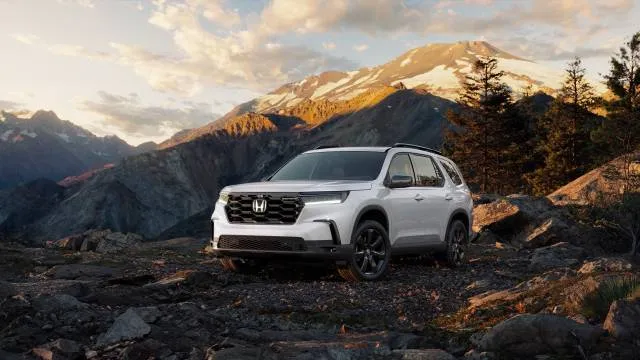
2025 Honda Pilot Black Edition
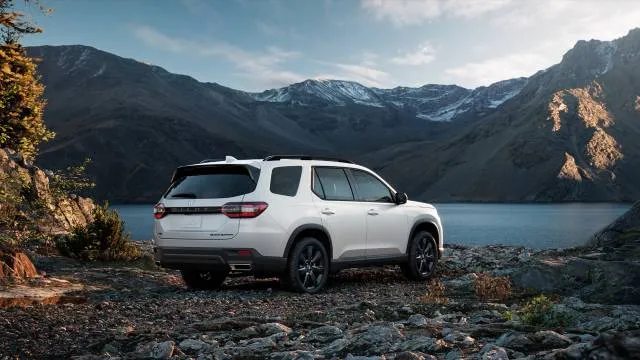
2025 Honda Pilot Black Edition
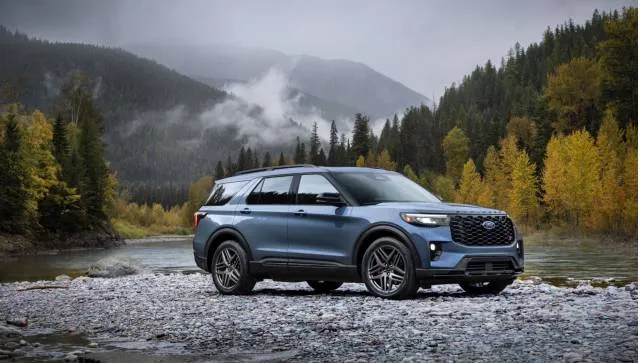
2025 Ford Explorer ST
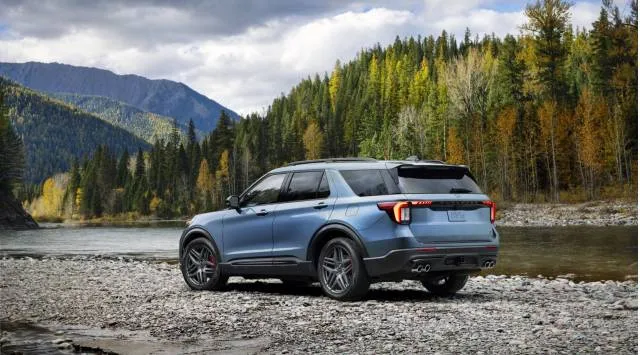
2025 Ford Explorer ST
Honda Pilot vs. Ford Explorer prices and features
-
Both the Pilot and Explorer start around $41,000
-
Fully loaded Explorer models cost more than loaded Pilots
-
Best picks: Honda Pilot EX-L, Ford Explorer ST-Line
How much is a Honda Pilot?
The base Honda Pilot Sport costs at least $41,000—but for that price, it includes eight seats, dual-zone climate control, power features, and a 7.0-inch touchscreen with Apple CarPlay and Android Auto, as well as a 3-year/36,000-mile warranty.
Most shoppers steer right ahead to the $45,000 Pilot EX-L, which can be fitted with captain’s chairs in the second row. It also gains wireless smartphone connectivity, a 9.0-inch touchscreen, a wireless smartphone charger, leather upholstery, and a power tailgate.
Fully loaded, a $56,000 Honda Pilot Black Edition gets navigation, 12-speaker Bose audio, 20-inch wheels, a head-up display, cooled front seats, digital gauges, and a surround-view camera system.
How much is a Ford Explorer?
Base Explorers now cost at least $41,350. That’s for the base Active version, which includes a power tailgate, power heated front seats, and a heated steering wheel. It and all versions include a 13.2-inch touchscreen infotainment system with 5G data, direct support for audio streaming and other apps from the Google ecosystem, and Apple CarPlay and Android Auto. Warranty coverage compares with a 3-year/36,000-mile one handling the basics.
We’d advise you to go with the mid-range ST-Line, which costs $46,110 and includes (or AWD for another $2,995) and includes a surround-view camera system, Bang & Olufsen premium audio, and other upgrades. The upcharge for all-wheel drive varies by model, but a $2,995 package on this trim level also brings painted wheels and upgraded brakes.
Although Platinum versions bring leather, heated second-row seats, and a twin-panel sunroof, it’s the $57,100 ST that stands at the top of the range, with a 400-hp turbo-V-6 and corresponding performance upgrades—although a fully loaded ST with AWD will cost about $10,000 more than that.
Advantage: The Pilot packs more value.
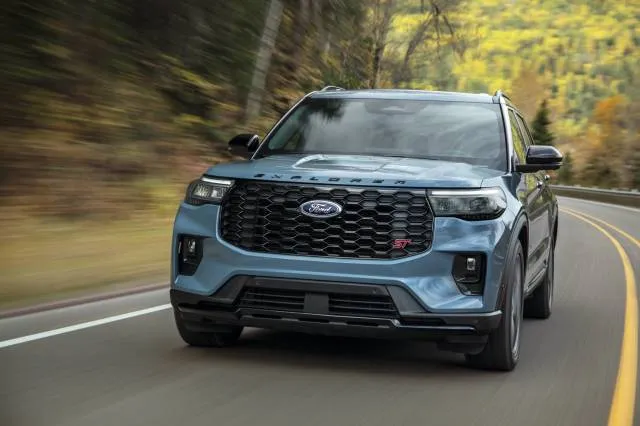
2025 Ford Explorer ST
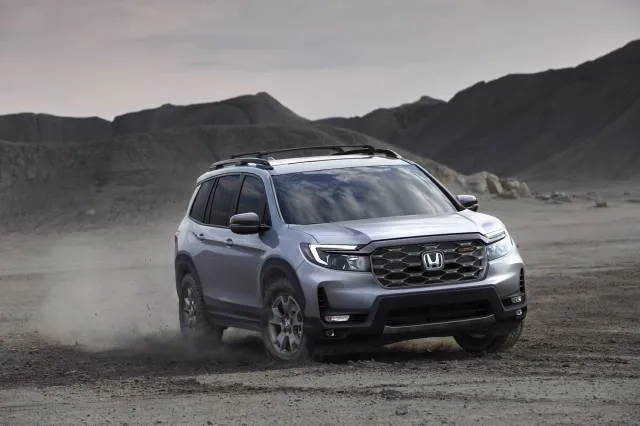
2025 Honda Pilot
Ford Explorer vs. Honda Pilot performance specs and towing
-
A turbo-4 comes standard on the Explorer
-
The Pilot’s V-6 is strong—but it’s the only engine option
-
AWD can be fitted on any of these
Is the Honda Pilot 4WD?
Most Pilots have front-wheel drive, but it can be configured on those FWD models for $2,100; it’s standard on the Elite, TrailSport, and Black Edition models. Honda’s version has a power split from the front to the rear wheels, which then can be split across the rear axle for more precise power delivery.
How fast is the Honda Pilot?
The current 3.5-liter V-6 in the Pilot sounds and acts a lot like the former V-6. It’s muscular, sounds good at high revs, and can adapt its responses through a set of drive modes that include programs for snow driving, towing, and off-roading. Honda’s 10-speed automatic flips through gears without fuss, and paddle shift controls give the driver even more control over how power is applied.
From Sport versions to the TrailSport, the Pilot has responsive, lighter-weight steering that feels connected to the road, even when it’s strapped with bigger, more numb 20-inch wheels (18-inchers come standard on lower-end versions). It’s a soothing machine in which to ride, with its independent front and rear suspension tuned very well for interstate driving, and agile enough to dance around potholes while it rolls over speed bumps.
The Pilot can tow up to 5,000 pounds. The TrailSport edition has gained a moderate amount of off-road traction, with all-terrain tires and a front skid plate, as well as an available surround-view camera system with a specific display of under-vehicle obstacles when needed.
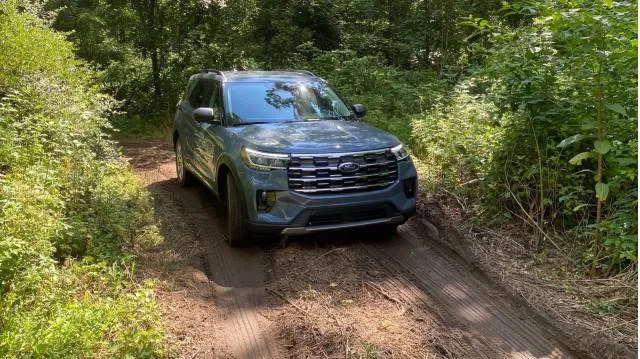
2025 Ford Explorer
Is the Ford Explorer 4WD?
Most models have standard rear-wheel drive, with roughly a $2,000 upcharge for all-wheel drive (although prerequisites vary by trim).
How fast is the Ford Explorer?
The 300-hp 2.3-liter turbo-4 that’s found in most Explorers may not sound brawny enough on paper, but skip that gut reaction: It’s powerful, quiet enough, and coupled to a 10-speed automatic that knows how to extract the most from it. Ford estimates a 0-60 mph time of under seven seconds in the turbo-4 Explorer.
A 3.0-liter turbo V-6 making 400 hp is optional on the Platinum and standard on the performance-oriented ST version. The ST can zip to 60 mph in the vicinity of 5.5 seconds; Ford’s 10-speed automatic can be a little more hesitant here, paradoxically, but you do get steering-wheel paddle shifters in this version, so as to click through the gears when needed.
The Explorer has an independent suspension at both ends, and its rear-drive origins give it a lower, more sporting stance, which translates to a composed ride and less body lean than in some other three-row SUVs. It’s a marginal point to argue in vehicles that have other priorities—but it’s still of note.
The entire Explorer lineup can tow 5,000 pounds, and Ford notes that it no longer requires an option package to do so.
Advantage: Even though it’s turbo-4 versus V-6, it’s a draw.
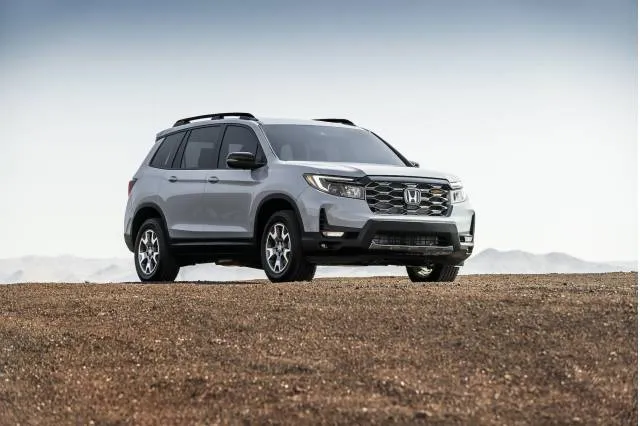
2025 Honda Pilot
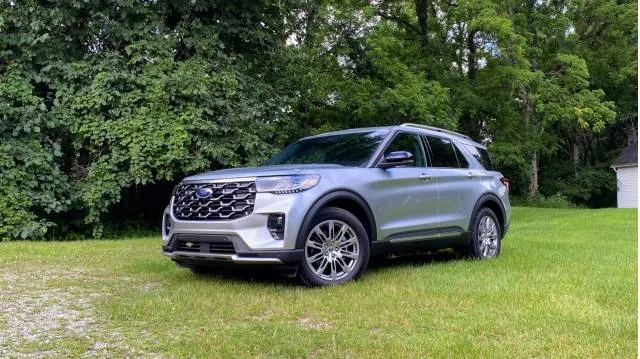
2025 Ford Explorer
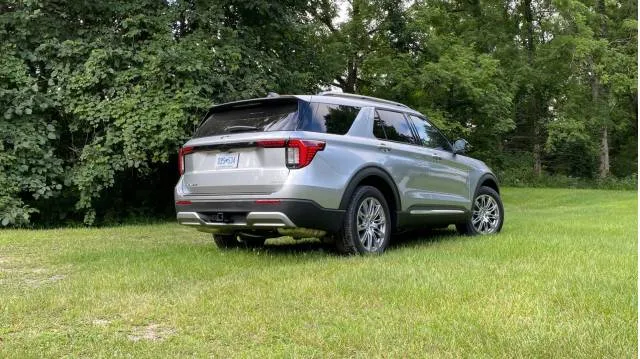
2025 Ford Explorer
Ford Explorer vs. Honda Pilot gas mileage
-
Neither of these models are offered as hybrids
-
Turbo-4 Explorers are a little stingier on gas than V-6 Pilots
Is the Honda Pilot good on gas?
It’s OK. At best, the Pilot earns EPA ratings of 22 mpg combined in most front-drive editions. All-wheel drive pushes that down to 21 mpg, and TrailSports check in at 20 mpg combined.
Is the Ford Explorer good on gas?
It’s better than the Pilot. Rear-wheel-drive versions of the Explorer with its most common engine, the turbo-4, get an EPA-rated 20 mpg city, 29 highway, 24 combined, while AWD versions get 20/27/23. Through 2023 there was a Hybrid model, but Ford says it’s not coming back for 2025 and only “under consideration” for the future.
Advantage: The Explorer, by a nose.
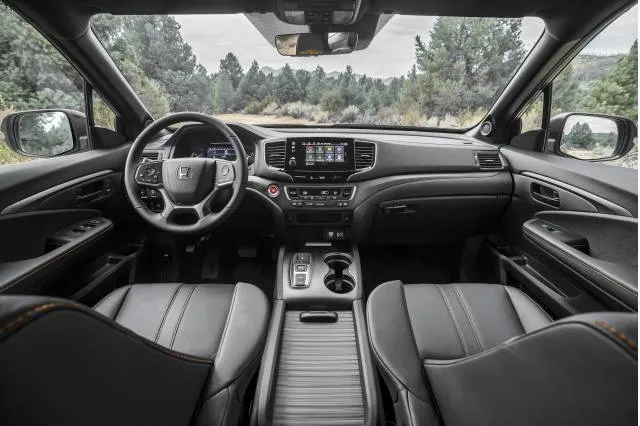
2025 Honda Pilot
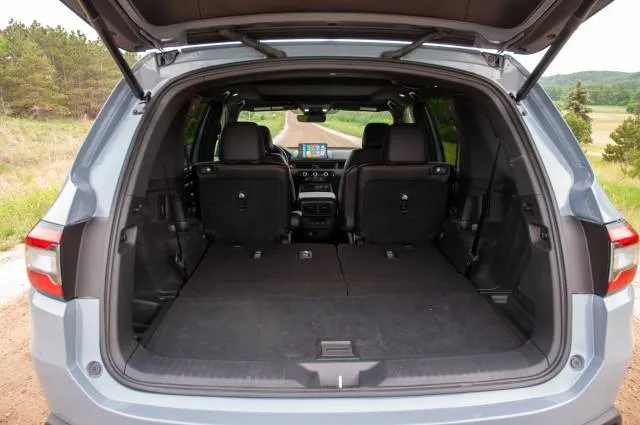
2023 Honda Pilot
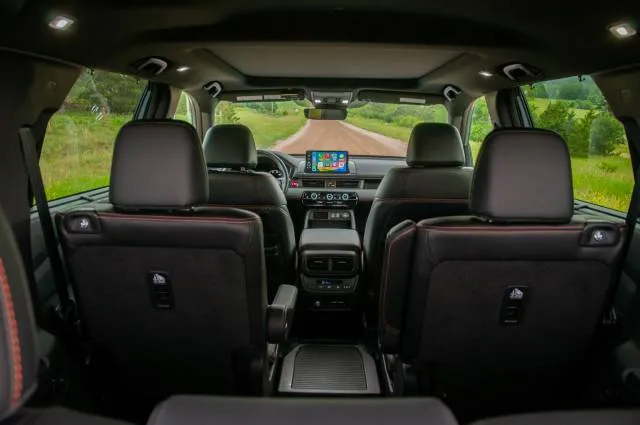
2023 Honda Pilot
Honda Pilot vs. Ford Explorer interior and cargo space
-
The Explorer’s suitable for up to seven passengers
-
Explorer’s third-row is smaller, harder to access than Pilot’s
-
Honda’s third row can seat tall people better
-
Cargo space gives Honda the win
How big is the Ford Explorer?
Ford designed the Explorer to seat up to seven people and their gear. It’s a large vehicle, no doubt—but not quite as large as some three-row SUVs. For that, Ford will gladly usher you into the Expedition.
The Explorer’s interior for 2025 gets a completely redesigned dashboard, new seat upholsteries, redesigned door panels, and different trim to match, and the look is thoroughly modern. The new contours of the dash push forward a bit, maximizing the sense of space in front, although the Explorer’s center console is too wide and makes the footwells feel tight. The centerpiece of the new dash layout is a front-and-center smartphone storage zone—accommodating two phones, with wireless charging on the left. There’s small-item storage all around, and soft-touch materials throughout; it feels like a premium SUV, although we’re less impressed with some of the upholsteries in top-trim versions than we are the synthetic and mixed-material seat surfaces in base Active and mid-level ST-Line versions, respectively.
For the second row, you can choose from the bench seat (seven-passenger) or the captain’s chairs (six-passenger) in most of the lineup, with base Active versions sticking to the bench and ST versions fully embracing the six-passenger layout.
The bench splits into three sections, and either of the layouts are comfortable for adults.
The third row isn’t anywhere close to as comfortable, and it’s difficult to access, especially with the bench seat. It’s very low (think head-on-knees for taller adults) with the tapered roofline affording barely enough headroom. There’s just 16.3 cubic feet of cargo space behind the third row, expanding out to 46.0 cubic feet when it’s folded flat, so you might as well leave it folded most of the time. With the back two rows out of the way the Explorer can carry 85.8 cubic feet of stuff.

2023 Honda Pilot
How big is the Honda Pilot?
It’s a much larger vehicle than the Explorer, and it shows from the first row on back.
In front, the Pilot’s seats have better support than those in the Explorer, thanks to redesigned cushions and frames, as well as power front seats that are heated. Honda adds leather upholstery on the EX-L and above, too.
A deep console between the front seats has a padded surface, lots of storage, and blends into cupholders and a well for wireless smartphone charging.
The second-row bench seat splits three ways, or on some versions, offers an interesting but not entirely useful removable middle seat. Only offered on Touring and Elite Pilots, that pull-out seat weighs about 25 pounds and can be stowed in the cargo area. It’s not as useful as the extra 2.4 inches of legroom built into this Pilot, which means 6-footers sit easily behind other 6-footers. Headroom remains a strong point too, though Honda put the seat about two inches higher than in the last Pilot.
With a tap of a pushbutton, the second-row seat slides out of the way for better third-row access. It has a raised floor and enough legroom for all but taller adults, so it’s a more useful space than that in the Explorer—but its 22.4 cubic feet of cargo space gets boosted to 60.1 cubic feet when the third row’s tucked into the floor. Fold down the middle seats and the Honda Pilot has more than 112 cubic feet of cargo space—that’s in minivan range. Although the Pilot’s only an inch or two longer, its roofline doesn’t taper like the Explorers, and that plus its low load floor pay off big.
Advantage: The Pilot, by more than 25 cubic feet.
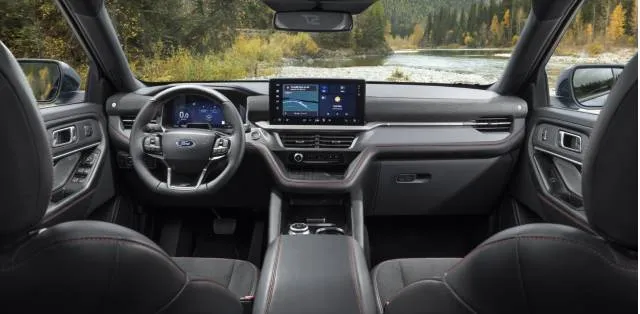
2025 Ford Explorer ST
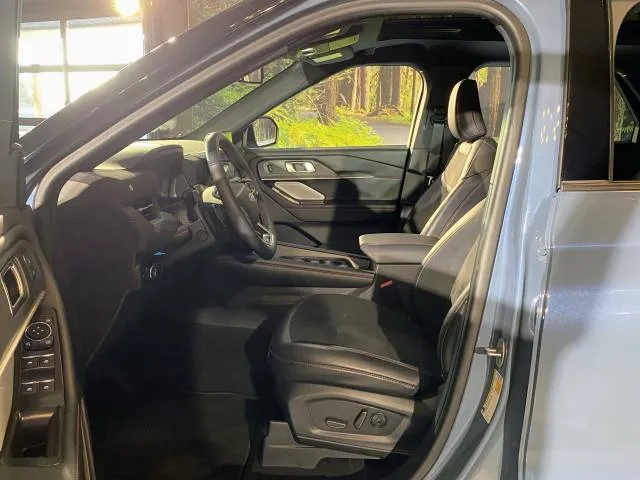
2025 Ford Explorer
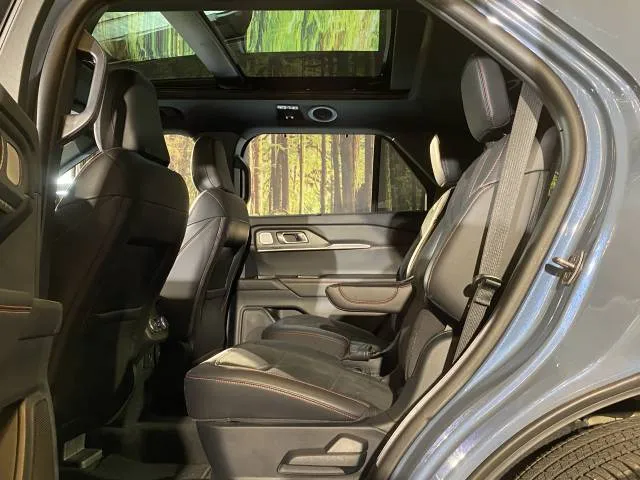
2025 Ford Explorer
Ford Explorer vs. Honda Pilot safety
-
The Explorer has great credentials but lacks updated crash-test results
-
Outward visibility is better in the Pilot
-
Surround-view camera systems are optional on both
How safe is the Honda Pilot?
The IIHS gives it a Top Safety Pick+ award, and the NHTSA has awarded it five stars overall. All Pilots come with adaptive cruise control, automatic emergency braking, active lane control, blind-spot monitors, and automatic high beams. The EX-L and above have front and rear parking sensors. A surround-view camera system with off-road views can be fitted.
How safe is the Ford Explorer?
The IIHS previously gave the Explorer a Top Safety Pick award, while the NHTSA doled out five stars, but with a redesigned interior, upholstery, door panels, and dash, it’s likely the Explorer will need to be retested. Automatic emergency braking comes standard, along with blind-spot monitors, active lane control, and automatic headlights. Front parking sensors, an advanced intersection-assist system, and a surround-view camera system are optional. Ford also boasts that its latest version of BlueCruise is included (subscription required), allowing hands-free driving with continued driver focus on mapped roads. It may be useful to reduce fatigue, but consider it a tech feature, not a safety item.
Advantage: The Pilot, but updated Explorer ratings might make it close again.
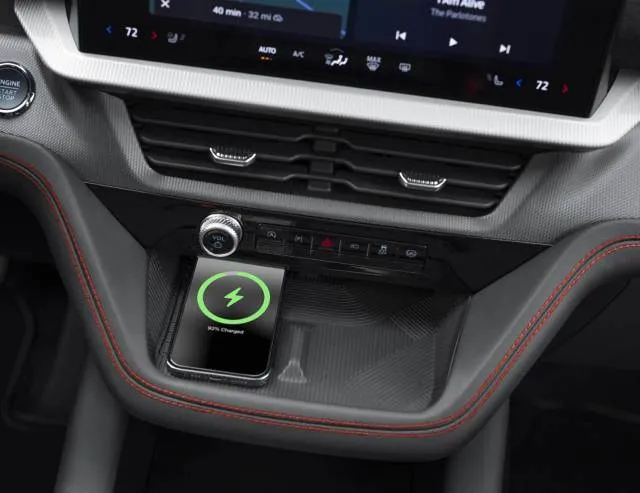
2025 Ford Explorer
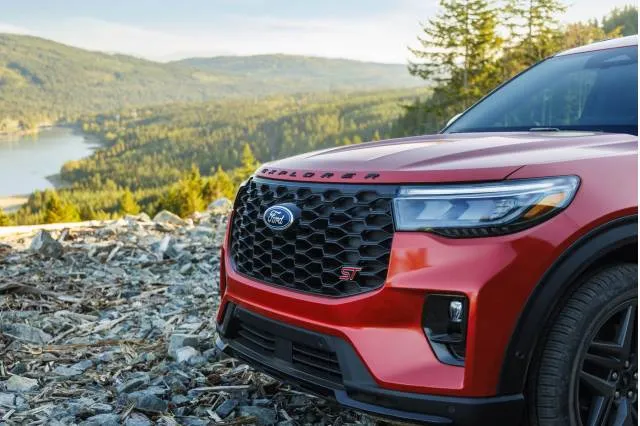
2025 Ford Explorer

2023 Honda Pilot
Ford Explorer vs. Honda Pilot styling
-
The Explorer’s sport-wagon sleek
-
The Pilot is a neat take on traditional SUV cues
-
Explorer wins the interior wars
Is the Honda Pilot a good-looking car?
It has a new take on the front end, with slim LED headlights and a mesh grille that mesh well with the angular shapes at the rear end. The Pilot channels some of Honda’s old Passport from many angles—and we’re glad the resemblance stops at the silhouette. Inside, the Pilot has a straightforward design that sets the dash high for visibility, uses simple buttons and knobs for important functions, and drops a touchscreen on top for good infotainment measure. We’re still not in love with Honda’s saddle-style transmission controls, but they’re more a foible than a fumble.
Is the Ford Explorer a good-looking car?
The Ford Explorer was shifted to a rear-wheel-drive platform for its last big 2020 redesign, which set the proportions in a sportier, more muscular direction versus the Pilot and pretty much everything else in its class. This year’s refresh only updates the front and rear look slightly, and the sport-wagon proportions aren’t fresh but they still work well. Fortunately, Ford has addressed the Explorer’s biggest inadequacy—its interior—in a big way for 2025. With a new dash design that includes a smartphone shelf front and center, soft touchpoints nearly everywhere, and a shift away from the drab surfaces and matte-metallic bezels of its predecessor, the Explorer now feels decidedly upscale. Factor in the big 13.2-inch touchscreen atop the dash and it’s functional and attractive.
Advantage: The Explorer edges ahead because of what’s inside.
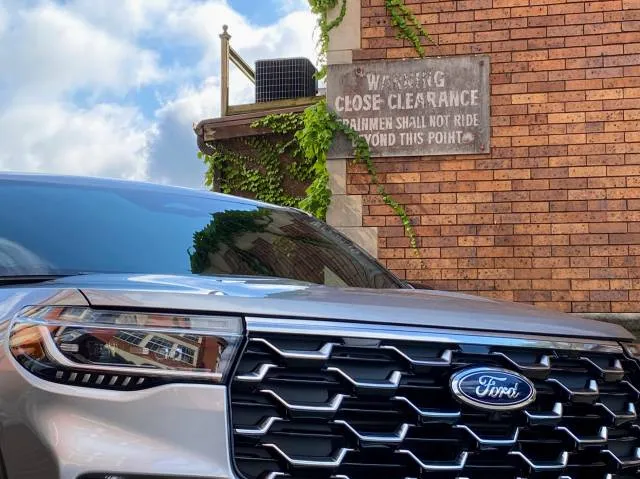
2025 Ford Explorer
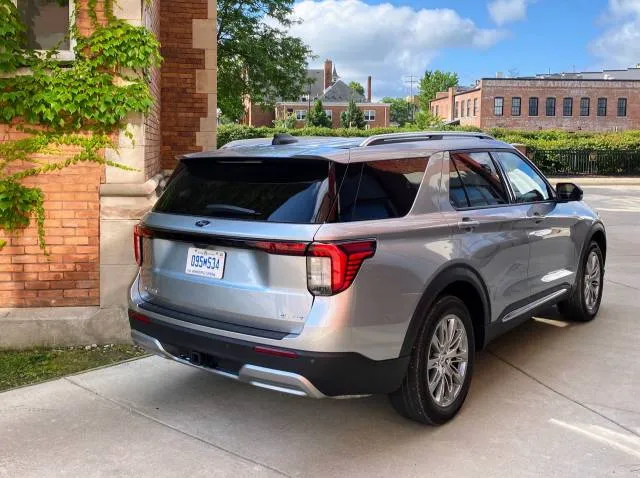
2025 Ford Explorer
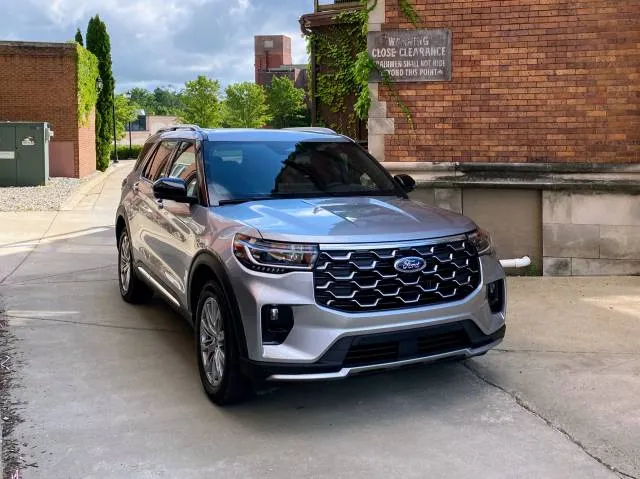
2025 Ford Explorer
Which is better: Ford Explorer or Honda Pilot?
The Explorer takes a great leap ahead in the look and feel of its cabin, and it arguably is a step ahead in many tech aspects. But the Honda Pilot has more room, a solid safety record, and a more adventurous TrailSport edition, while its most popular trims maintain a value-for-money edge. It earns a TCC Rating of 7.0 out of 10. (Read more about how we rate cars.) The Explorer, meanwhile, fares well with a TCC Rating of 6.4 out of 10, which could get a small boost once its rated for safety.



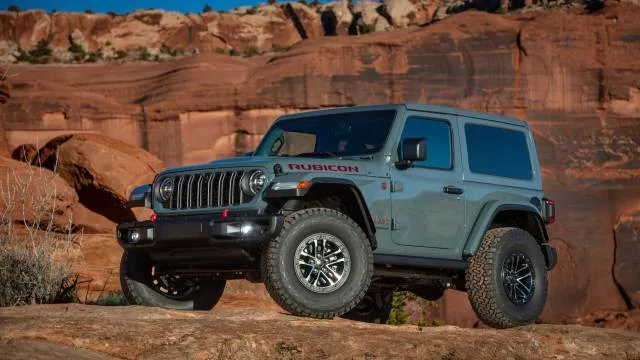
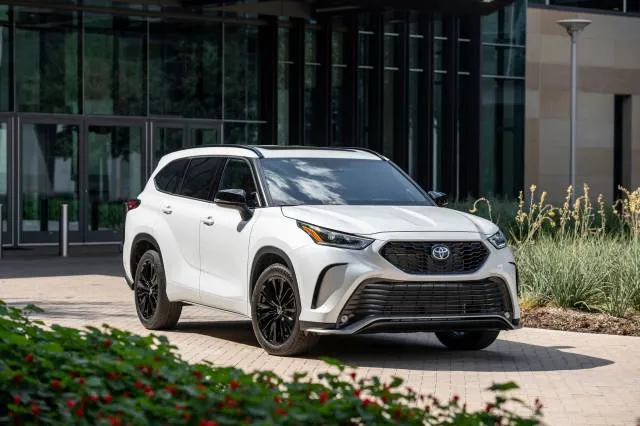
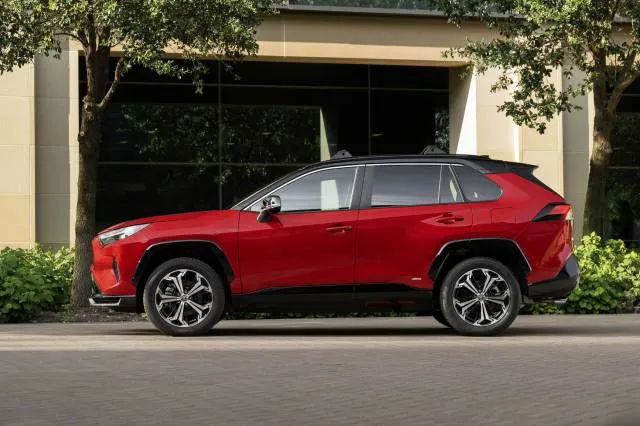
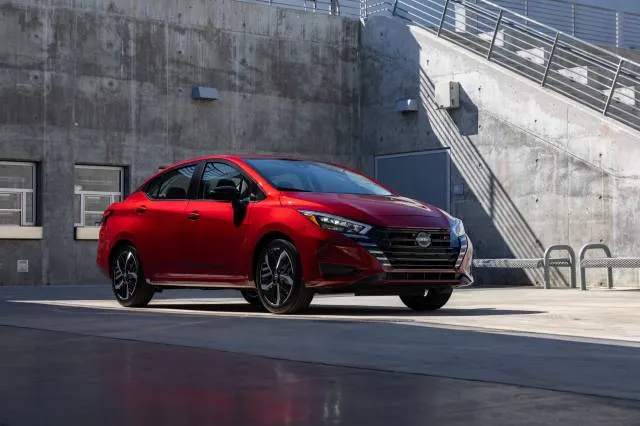
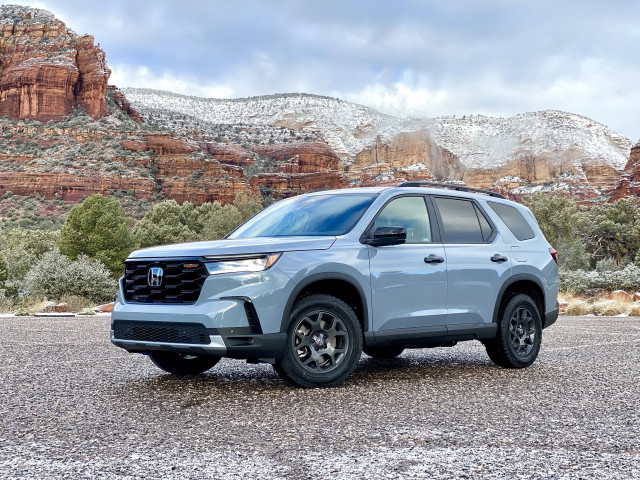
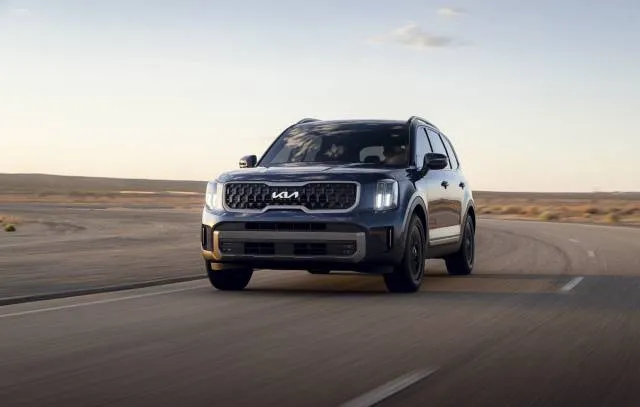
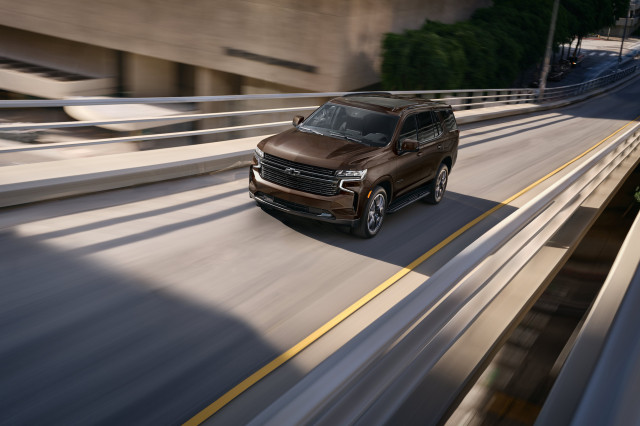
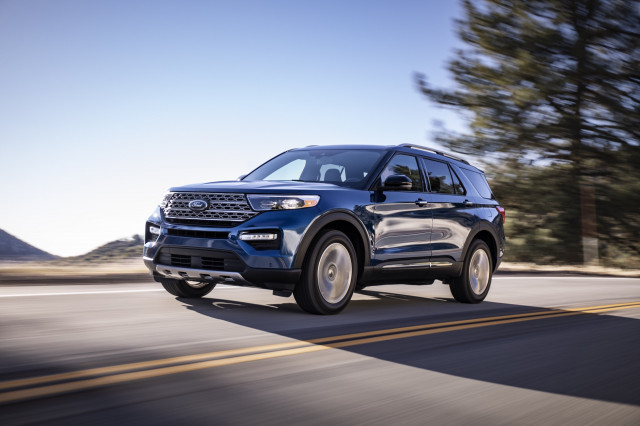






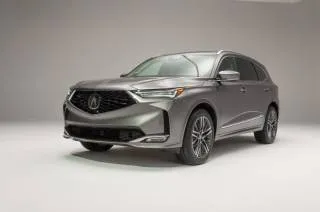

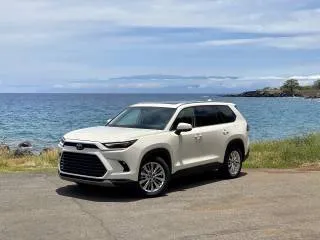
Email This Page